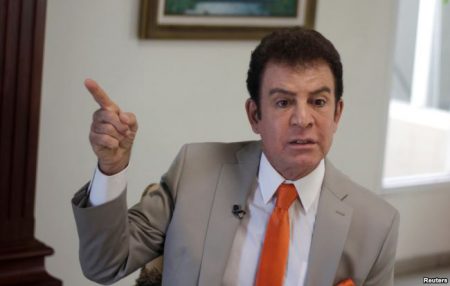TEGUCIGALPA, (Reuters) – The Organization of American States yesterday said it could not be sure Honduras’ president won a second term in an election last week, citing irregularities and errors in the process and calling for a recount of nearly a third of the votes.
Authorities finished counting votes yesterday after a week of increasingly widespread criticism about the Nov. 26 election, with the diplomatic body lending credence to opposition claims the government manipulated the results to ensure a win.
“The tight margin, along with the irregularities, errors and systematic problems that have surrounded this election, does not allow the mission to be certain about the results,” said former Bolivian President Jorge Quiroga, heading the OAS election observation mission in the Central American country.
Early on Monday electoral authorities said President Juan Orlando Hernandez won 42.98 percent of the vote, compared with opposition challenger Salvador Nasralla’s 41.39 percent, based on 99.96 percent of ballot boxes tallied.

However, the authorities refrained from declaring a winner, with Nasralla’s center-left opposition Alliance demanding a wide recount of nearly a third of votes, a request supported by the OAS and European Union election observers.
The Alliance, which claims that results sheets from ballot boxes were altered, is also likely to formally contest the results.
President Hernandez, who has been praised by the United States for his crackdown on street gangs, also refrained from calling himself the winner on Monday, despite claiming victory several times since the election.
“I make a call for peace, for brotherhood, for sanity, for national unity. My commitment to work for peace and tranquility of Honduras is more firm than ever,” he told reporters.
His government was struggling to contain the fallout from the chaotic election.
Additional powers granted to the army and police and a nighttime curfew from Friday have led to more than a thousand arrests but failed to stamp out protests. Up to 12 people have been killed in the protests or during a nighttime curfew imposed since Friday to try to contain the unrest.
Tens of thousands peacefully took to the streets on Sunday in a show of force for the opposition. Overnight, residents in the capital Tegucigalpa banged pots and blew horns to show anger at the curfew.
Apparently responding to former TV star Nasralla, who has called on security forces to rebel, more than two hundred members of the elite Cobras riot police unit in two cities said they would no longer help enforce the curfew, saying it was tantamount to taking sides.
“We are rebelling,” said one of the policemen, who covered his face in a ski mask and declined to give his name. “We call on all the police nationally to act with their conscience.”
The police also said they were angry about the death of two colleagues shot while they were enforcing the curfew on Sunday night, an attack a spokesman said was unrelated to the election protests.
Two civilian protesters were killed in the capital overnight, their relatives said, although authorities did not confirm the deaths.
Television images showed tear gas drifting over the elite police unit’s base and their armored riot trucks returning from the streets to cheers. Media reports said some members of other police units also protested, adding pay and conditions to their complaints.
It was not clear if the police rebellion would spread, as night fell and another curfew began.
The OAS called for peaceful protests, said politicians must not incite violence and said security forces must respect human rights.
Last week, at least three people were killed as soldiers broke up protesters’ blockades of rubble and burning tires. One police source and local reports said five more had been shot dead in the north of the country on Friday. The deaths have not been confirmed by authorities.
In a striking sign of support for Hernandez, the U.S. State Department cleared the way for Honduras to receive millions of dollars in U.S. aid two days after the election, certifying that the government has been fighting corruption and humans rights, a document seen by Reuters showed.
Early last week, Nasralla, a 64-year-old former sportscaster and game show host, appeared set for an upset victory over Hernandez, gaining a five-point lead with more than half of the ballots tallied.
The counting process suddenly halted for more than a day and began leaning in favor of Hernandez after resuming.
Opposition leaders on Monday showed a sample of their own records of polling that did not match with the tribunal’s and they reiterated demands for a recount of all the polling stations that were entered into the system after the delay.
“We’re not going to let the election be stolen,” said Manuel Zelaya, a former leftist president who was ousted in a coup in 2009 who has backed Nasralla.
Venezuelan President Nicolas Maduro accused the United States of backing vote fraud in Honduras, while the U.S. embassy on Monday called for a “transparent, impartial, and opportune election result.”
Honduras struggles with violent drug gangs, one of world’s highest murder rates and endemic poverty, driving a tide of its people to migrate to the United States.
Hernandez, 49, implemented a military-led crackdown on gang violence after taking office in 2014. He has been supported by U.S. President Donald Trump’s chief of staff, John Kelly.





